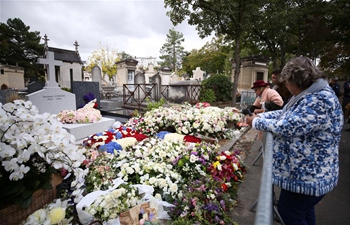NEW YORK, Oct. 2 (Xinhua) -- The drop of real estate prices in Manhattan, the business center of New York City, is expected to last for multiple quarters due to mild price bubble, high level of inventory and new completions, heavier tax burdens, less buying appetite of international investors as well as looming concerns about economic recession.
PRICE SEES FREE FALL
The sales price and volume of real estate in Manhattan underwent a double-digit decrease in the third quarter of 2019, according to statistics issued by multiple brokers or industry research institutions on Wednesday.
Average sales price of apartments in Manhattan in the third quarter dropped 21 percent from the previous quarter and 14.1 percent from the same period of 2018, according to the latest report jointly issued by real estate appraisal and consultant service provider Miller Samuel Inc. and Douglas Elliman Real Estate.
Meanwhile, the average price of apartment sales in Manhattan stood at 1,524 U.S. dollars per square feet in Q3, down 13.5 percent quarter-on-quarter and 5.3 percent year-on-year, respectively.
The average sales price of apartments in Manhattan stood at 1.64 million U.S. dollars per unit in Q3, down 24 percent quarter-on-quarter and 17 percent year-on-year, according to a report issued by real estate broker CORE Group Marketing LLC on Wednesday.
Market prices have gone from what was once described as kind and gentle correction to a near free fall. The last time conditions were described in such a manner was in the height of the global financial crisis, according to CORE.
After pending transfer tax increase resulted in a record-setting June, high-end closings fell sharply in the third quarter as expected, said a report by Halstead Real Estate on Wednesday.
The averaged sale price of apartments in Manhattan in Q3 sank 31.5 percent quarter-on-quarter and 13 percent year-on-year, respectively, according to Halstead Real Estate.
The total sales number in Manhattan in the last quarter dropped 16 percent year-on-year and the sales number of units with 5 million U.S. dollars of price dived 48 percent.
Real estate price in New York City fell slightly since the middle of 2018 and real estate bubble index in New York City weakened to 0.5, according to a global real estate bubble index report released by Swiss investment bank UBS Group AG on Sept. 30.
The housing market in New York remains overvalued though real estate price now is around 10 percent lower than peaking price in 2006.
SOFTNESS TO CONTINUE
Weakening support from the financial industry and an unfavorable tax treatment has led valuations to decrease in New York, UBS said.
The real estate price in Manhattan is going to be a slow grind over the year or two given a lot of uncertainties in the air, according to Jonathan Miller, CEO of Miller Samuel.
Higher transfer and mansion taxes in New York City starting from July 1 pushed up closing of deals ahead of new taxes and the data in the third quarter, reflecting a more accurate snapshot of continued price correction in the current market, said Diane Ramirez, CEO of Halstead Real Estate.
New York City adopted a new mansion tax rate of 1 percent to 3.9 percent for units with sales price of over 1 million U.S. dollars since July 1 in contrast with a flat mansion tax rate of 1 percent prior to the revision.
New York State also raised one-time transfer tax to 0.65 percent since July 1 up from earlier flat rate of 0.4 percent.
The amount of inventory available now and listings of newly-completed projects have put significant downward pressures on prices especially the high-end real estate, according to Garrett Derderian, managing director of market analysis at CORE.
Housing completion in New York reached a 50-year high in 2018 and the number of construction permits continues to stay at high level, according to UBS.
The new mansion tax would continue to take a toll on the housing market as buyers evaluate the impact on their finances and seasonal weakness of sales and price in the fourth quarter, said Derderian.
Many people want to avoid house purchases at the wrong time when reflecting on what happened in 2008, according to Rory Golod and Elizabeth Ann Stribling-Kivlan, experts with real estate broker Compass.
"The weaker economic momentum may offset the positive impact that Federal Reserve easing is having on financing costs," said UBS in its report.
Despite the improved affordability, a price rebound seems unlikely in the short term as the financial center in Manhattan lacks economic stimuli, said the report.
Housing in Manhattan remains unaffordable, since even a highly skilled worker needs to work for more than 10 years to afford an apartment of 650 square feet near the city center, noted UBS.
Moreover, international investors became a net seller of commercial property in New York City in the second quarter of 2019 for the first time since 2013, according to an earlier report by Real Capital Analytics.
The fall of cross-border investment in Manhattan in the first half of 2019 serves as a yellow warning sign, according to Real Capital Analytics.













